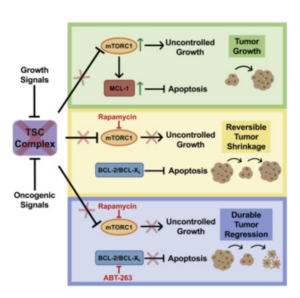 In a paper published in iScience, Reciprocal effects of mTOR inhibitors on pro-survival proteins dictate therapeutic responses in tuberous sclerosis complex, from the Laboratory of Professor Brendan Manning, MollyMcNamara Goodrich and colleagues unraveled the effects of mTOR activation and inhibition on BCL-2 family proteins, with immediate implications for the genetic tumor syndrome tuberous sclerosis complex (TSC).
In a paper published in iScience, Reciprocal effects of mTOR inhibitors on pro-survival proteins dictate therapeutic responses in tuberous sclerosis complex, from the Laboratory of Professor Brendan Manning, MollyMcNamara Goodrich and colleagues unraveled the effects of mTOR activation and inhibition on BCL-2 family proteins, with immediate implications for the genetic tumor syndrome tuberous sclerosis complex (TSC).
mTORC1 is aberrantly activated in cancer and in TSC. Owing to the prevalence of mTORC1 activation in tumors, there has been great interest in targeting mTORC1 pharmacologically. However, clinically approved mTORC1 inhibitors, such as rapamycin, elicit a cytostatic effect that fails to eliminate tumors and is rapidly reversible.
In this study, MET researchers discovered that mTORC1 inhibitors shift cellular dependence from MCL-1 to BCL-2/BCL-XL for survival. This effect can be exploited by combining rapamycin with a specific BH3 mimetic, yielding a more complete and sustained response than rapamycin alone in a mouse tumor model of TSC.
Thus, these findings reveal a therapeutic strategy that combines rapamycin, which many TSC patients are currently taking, with a BH3 mimetic to yield a durable anti-tumor response in a disease where current first-line therapies are incomplete and rapidly reversible.
Click to Access Publication


